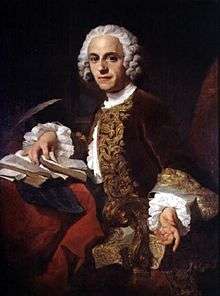Horatio Walpole, 4th Earl of Orford (24 September 1717 – 2 March 1797), more commonly known as Horace Walpole, was a British politician and writer, noted for his collected letters and for having written the first Gothic horror novel, The Castle of Otranto (1764).
Quotes


Prognostics do not always prove prophecies, — at least the wisest prophets make sure of the event first.
- When I first came abroad, every thing struck me, and I wrote its history; but now I am grown so used to be surprised, that I don't perceive any flutter in myself when I meet with any novelties; curiosity and astonishment wear off, and the next thing is, to fancy that other people know as much of places as one's self; or, at least, one does not remember that they do not. It appears to me as odd to write to you of St. Peter's, as it would do to you to write of Westminster-abbey. Besides, as one looks at churches, &c. with a book of travels in one's hand, and sees every thing particularised there, it would appear transcribing, to write upon the same subjects.
- Letter to Richard West, from Rome, 16 April 1740, p. 42, The Letters of Horace Walpole, ed. P. Cunningham, vol. 1
- Harry Vane, Pulteney's toad-eater.
- Letter to Sir Horace Mann (1742)
- It always amazes me, when I reflect on the women, who are the first to propagate scandal of one another. If they would but agree not to censure what they all agree to do, there would be no more loss of characters among them than amongst men. A woman cannot have an affair, but instantly all her sex travel about to publish it and leave her off: now, if a man cheats another of his estate at play, forges a will, or marries his ward to his own son, nobody thinks of leaving him off for such trifles!
- Letter to Sir Horace Mann, 25 Sept. 1742, pp. 202–203, The Letters of Horace Walpole, ed. P. Cunningham, vol. 1
- Why, I'll swear I see no difference between a country gentleman and a sirloin; whenever the first laughs, or the latter is cut, there run out just the same streams of gravy! ... Oh! my dear Sir, don't you find that nine parts in ten of the world are of no use but to make you wish yourself with that tenth part? ...
- Letter to John Chute, from Houghton, 20 Aug. 1743, p. 265, The Letter of Horace Walpole, ed. P. Cunnighham, vol. 1
- Our supreme governors, the mob.
- Letter to Sir Horace Mann (7 September 1743)
- My aversion to them...springs from the perniciousness of that sect to society—I hate Papists, as a man, not as a Protestant. If Papists were only enemies to the religion of other men, I should overlook their errors. As they are foes to liberty, I cannot forgive them.
- Memoirs from the Declaration of the War with Spain (1746)
- If a passion for freedom is not in vogue, patriots may sound the alarm till they are weary.
The Act of Habeas Corpus, by which prisoners may insist on being brought to trial within a limited time, is the corner-stone of our liberty.- Notes of 1758, published in Memoires of the Last Ten Years of the Reign of George the Second (1822), p. 226; also published as "Memoirs of the Year 1758" in Memoirs of King George II, Vol. III (1985), p. 10
- A tragedy can never suffer by delay: a comedy may, because the allusions or the manners represented in it maybe temporary.
- Letter 123 To Robert Jephson (13 July 1777)
- Instead of the glorious and ever-memorable year 1759, as the newspapers call it, I call it this ever-warm and victorious year. We have not had more conquest than fine weather: one would think we had plundered East and West Indies of sunshine. Our bells are worn threadbare with ringing for victories. I believe it will require ten votes of the House of Commons before people believe it is the Duke of Devonshire that has done this, and not Mr. Pitt.
- Letter to George Montagu (21 October 1759)
- The world is a comedy to those that think; a tragedy to those that feel.
- Letter to Anne, Countess of Ossory, (16 August 1776)
- A favourite saying of Walpole's, it is repeated in other of his letters, and might be derived from a similar statement attributed to Jean de La Bruyère, though unsourced: "Life is a tragedy for those who feel, and a comedy for those who think". An earlier form occurs in another published letter:
- I have often said, and oftener think, that this world is a comedy to those that think, a tragedy to those that feel — a solution of why Democritus laughed and Heraclitus wept.
- Letter to Sir Horace Mann (31 December 1769)
- It was easier to conquer it [the East] than to know what to do with it.
- Letter to Sir Horace Mann (27 March 1772)
- A careless song, with a little nonsense in it now and then, does not misbecome a monarch.
- Letter to Sir Horace Mann (1774); this is derived from an proverb of unknown authorship: "A little nonsense now and then / Is relished by the wisest men".
- The way to ensure summer in England is to have it framed and glazed in a comfortable room.
- Letter to Willam Cole (28 May 1774)
- The next Augustan age will dawn on the other side of the Atlantic. There will, perhaps, be a Thucydides at Boston, a Xenophon at New York, and, in time, a Virgil at Mexico, and a Newton at Peru. At last, some curious traveller from Lima will visit England and give a description of the ruins of St Paul’s, like the editions of Balbec and Palmyra.
- Letter to Sir Horace Mann (24 November 1774)
- To act with common sense, according to the moment, is the best wisdom I know; and the best philosophy, to do one's duties, take the world as it comes, submit respectfully to one's lot, bless the goodness that has given us so much happiness with it, whatever it is, and despise affectation.
- Letter to Sir Horace Mann (27 May 1776)
- The whole nation hitherto has been void of wit and humour, and even incapable of relishing it.
- On Scotland, in a etter to Sir Horace Mann (1778); comparable to "It requires a surgical operation to get a joke well into a Scotch understanding", by Sydney Smith, Lady Holland's Memoir, vol. i. p. 15.
- Prognostics do not always prove prophecies, — at least the wisest prophets make sure of the event first.
- Letter to Thomas Walpole (19 February 1785)
- It is the story of a mountebank and his zany.
- Statement about Samuel Johnson and James Boswell, as described in Boswell's Journal of a Tour to the Hebrides with Samuel Johnson, LL.D., in a letter to Hon. Henry Conway (6 October 1785)
- Allen of Bath procured them the same honours from thence; and for some weeks it rained gold boxes: Chester, Worcester, Norwich, Bedford, Salisbury, Yarmouth, Tewkesbury, Newcastle-on-Tyne, Stirling, and other populous and chief towns following the example. Exeter, with singular affection, sent boxes of heart of oak.
- "The sending of boxes to William Pitt in 1757" in Memoirs of the Reign of King George II (London, 1846–47), Vol. II, p. 202
- Posterity always degenerates till it becomes our ancestors.
- As quoted in "The Works of Horace Walpole, Earl of Orford" in The Monthly Review, or, Literary Journal, Vol. 27 (1798) edited by Ralph Griffiths, p. 187
- Men are often capable of greater things than they perform. They are sent into the world with bills of credit, and seldom draw to their full extent.
- As quoted in "The Works of Horace Walpole, Earl of Orford" in The Monthly Review, or, Literary Journal, Vol. 27 (1798) edited by Ralph Griffiths, p. 187
- He was my counsel in affairs, was my oracle in taste, the standard to whom I submitted my trifles, and the genius that presided over poor Strawberry.
- On the death of his friend John Chute (1776)
- As quoted in The National Trust Magazine, Spring 2011, p. 09
The Castle of Otranto (1764)
- All quotes from the text of "The Castle of Otranto" at Project Gutenberg
- Manfred was not one of those savage tyrants who wanton in cruelty unprovoked. The circumstances of his fortune had given an asperity to his temper, which was naturally humane; and his virtues were always ready to operate, when his passions did not obscure his reason.
- Section 1
- “Peace, simpleton!” said the Princess. “Though he said he was unhappy, it does not follow that he must be in love.”
- Section 2
- Have done with this rhapsody of impertinence.
- Section 2
- “Heaven,” replied Manfred, “does not send Heralds to question the title of a lawful Prince. I doubt whether it even notifies its will through Friars—but that is your affair, not mine.
- Section 3
- You think me ambitious: ambition, alas! is composed of more rugged materials. If I were ambitious, I should not for so many years have been a prey to all the hell of conscientious scruples.
- Section 3
- Thy purpose is as odious as thy resentment is contemptible.
- Section 3
- “My councils do not need a Friar’s intervention,” said Manfred; “and of all men living is that hoary traitor the only one whom you delight to confer with?”
- Section 4
Misattributed
- The whole secret of life is to be interested in one thing profoundly and in a thousand things well.
- Widely misattributed in print and on the internet, this is actually Hugh Walpole, in Reading : An Essay (1926)
Quotes about Horace Walpole
- His politics are always under the strong influence of party and often of faction, and his details of social life and personal character are rendered more amusing indeed, but less trustworthy, by a strong seasoning of scandal, and occasionally of malice. It is not given to man to be at once of a party, and impartial — to be a gossip, and not censorious. We do not take the characters of Lord Wharton or Sir Robert Walpole from Swift, nor should we from Horace Walpole those of Bute or North.
External links



- Works by Horace Walpole at Project Gutenberg
This article is issued from
Wikiquote.
The text is licensed under Creative
Commons - Attribution - Sharealike.
Additional terms may apply for the media files.

